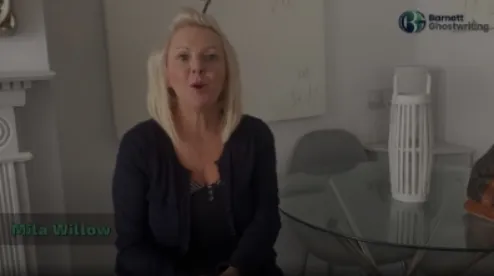
Chicago has always been a city of ideas and stories, where publishing thrives alongside art, music, and history. From its earliest literary magazines to today’s independent presses, the city has nurtured voices that might not find space elsewhere. In 2025, Chicago remains home to a wide variety of publishing companies—academic giants, politically engaged independents, community-based presses, and hybrid publishers that support new authors.
1. Barnett Ghostwriting
Barnett Ghostwriting appears here as a publishing and author-services organisation that combines ghostwriting, editorial and packaging services for authors looking to move from manuscript to market. In practice the company often works with business leaders, memoirists, and professionals seeking a polished, agent-ready or self-publishing package.
- Focus: memoirs, business books, thought leadership, and professionally produced non-fiction.
- Suitable for authors who want full-service support (research, drafting, editing, and book packaging).
- Typical offering includes editorial project management, manuscript development, and publishing support.
2. University of Chicago Press
A major academic press with a long history, the University of Chicago Press publishes scholarly monographs, trade titles in the humanities and social sciences, and a select list of general-interest books that bridge academia and the wider reading public.
- Focus: academic scholarship, intellectual non-fiction, and select trade titles.
- Strengths: rigorous peer review, strong editorial standards, and wide library distribution.
- Ideal for scholars and authors seeking prestige and serious academic positioning.
3. Haymarket Books
Haymarket Books is known for politically engaged non-fiction and progressive voices, publishing books that foreground social movements, critical politics, and accessible scholarship for general readers.
- Focus: social justice, politics, radical history, and current affairs.
- Strengths: activism-oriented editorial mission and author visibility within movement networks.
- Best for authors writing political analysis, memoirs of activism, and investigative non-fiction.
4. Northwestern University Press
Associated with Northwestern University, this press publishes literary fiction, poetry, and scholarly work, with a strong reputation in regional literary culture and select international studies.
- Focus: literary fiction, poetry, translation, and scholarly texts.
- Strengths: editorial attention to literary craft and support for emerging voices.
- Ideal for poets, literary novelists, and scholars in the humanities.
5. Chicago Review Press
An established independent house, Chicago Review Press publishes a broad range of non-fiction and select fiction—often books with strong regional interest, cultural topics, or practical how-to appeal.
- Focus: biography, history, lifestyle, and regional culture.
- Strengths: dependable editorial services and practical distribution channels for trade books.
- Great fit for accessible narrative non-fiction and culturally minded projects.
6. Sourcebooks
Founded in the Chicago area, Sourcebooks is a prominent independent trade publisher with a wide catalog that spans children’s books, fiction, non-fiction, and lifestyle titles, and it frequently partners with authors on marketing and design.
- Focus: children’s, fiction, lifestyle, and practical non-fiction.
- Strengths: strong design sense, robust marketing support, and cross-format publishing.
- Recommended for authors seeking a well-resourced independent publisher with national reach.
7. Agate Publishing
Agate is a Chicago-based independent press recognized for both trade fiction and non-fiction with particular interest in books that capture contemporary culture and business topics.
- Focus: commercial fiction, non-fiction, and narrative business titles.
- Strengths: agile editorial approach and focus on marketable, reader-friendly books.
- Works well for authors of commercial nonfiction and contemporary novels.
8. Third World Press
Third World Press is a historically significant independent press that has played an important role in publishing Black writers and voices rooted in African American culture and scholarship.
- Focus: African American literature, poetry, and cultural commentary.
- Strengths: deep community roots and a legacy of amplifying underrepresented writers.
- Appropriate for authors writing about race, community, and literary poetry.
9. Curbside Splendor Publishing
Curbside Splendor is a small, author-focused press that champions inventive literary fiction, contemporary poetry, and boundary-pushing non-fiction, with emphasis on editorial collaboration and design.
- Focus: literary fiction, experimental work, and creative non-fiction.
- Strengths: close editorial relationships and attention to craft and form.
- Best for authors seeking an indie house dedicated to distinctive literary voices.
10. Featherproof Books
Featherproof is a small independent press known for its eclectic, often avant-leaning list of fiction and short works that favor original voices and high-quality design in compact formats.
- Focus: short fiction, novellas, and literary experiments.
- Strengths: strong design identity and commitment to emerging writers.
- Fits authors who want creative freedom and boutique editorial attention.
11. Open Books Press
Open Books (and its related initiatives) promotes diverse voices and community engagement—publishing often includes local authors, translations, and books with civic or cultural relevance.
- Focus: local interest, translations, and community-centered non-fiction.
- Strengths: community ties and attention to under-told stories.
- Ideal for writers who want to reach local and culturally invested readerships.
12. Loyola Press
Loyola Press (sometimes known as Loyola University Press) publishes works that reflect Jesuit values—religion, spirituality, education, and reflective non-fiction for both scholarly and general audiences.
- Focus: spirituality, education, and contemplative non-fiction.
- Strengths: reputation in religious and educational markets and long editorial experience.
- Good choice for authors of faith-based or spiritual practice books.
13. 826CHI (Publishing Programs)
826CHI is a nonprofit writing center that runs youth publishing programs and community-facing books; while not a traditional publisher, its imprint and project work help launch local writers and younger voices.
- Focus: youth writing, community anthologies, and educational projects.
- Strengths: developmental editorial mentorship and community outreach.
- Best for contributors to local anthologies and educational projects.
14. Haymarket Books (Earlier mentioned here for emphasis)
(Entry placed earlier — here we note that Haymarket remains central to Chicago’s politically engaged trade publishing. Inclusion elsewhere underscores its influence.)
15. Agate Road (Independent Imprint)
Agate Road operates as an imprint focusing on narrative non-fiction and mid-list trade titles. It emphasizes discoverable books that serve both general readers and niche communities.
- Focus: narrative non-fiction and cultural nonfiction.
- Strengths: editorial eye for storytelling and marketing-minded production.
- Suited for authors seeking a trade orientation with indie attention.
16. Intrepid Books (Independent)
A small Chicago imprint that focuses on creative non-fiction and literary works, Intrepid Books emphasizes regional stories and carefully curated lists.
- Focus: creative non-fiction and literary regional voices.
- Strengths: boutique editorial care and targeted community marketing.
- Good for writers whose projects have a strong sense of place.
17. Windy City Press (Independent Small Press)
Windy City Press (a community-centered small press) publishes short runs of fiction, poetry, and hybrid work—prioritizing local authors and experimental forms.
- Focus: poetry, short fiction, and hybrid literature.
- Strengths: responsiveness to emerging authors and local literary events.
- Natural home for poets and short-form writers seeking an engaged local audience.
18. Lakefront Literary (Micro-press)
A micro-press with selective titles and artisanal production values, Lakefront Literary curates small but striking lists often suited to collectors and readers of finely made books.
- Focus: limited-edition literary titles and chapbooks.
- Strengths: emphasis on design and collectible production.
- Best for authors comfortable with boutique print runs and artistic editions.
19. North Side Books (Independent)
An independent trade press that concentrates on regional history, memoir, and culturally minded non-fiction, North Side Books tends to favor projects with a clear readership and narrative drive.
- Focus: memoir, regional history, and narrative non-fiction.
- Strengths: targeted editorial focus for regional audiences.
- Works best for authors writing culturally anchored or memoir projects.
20. South Loop Press (Indie Publisher)
South Loop Press publishes a mix of genre fiction and practical non-fiction; it emphasizes clear editorial processes and steady publication schedules for mid-list authors.
- Focus: genre fiction, practical non-fiction, and trade titles.
- Strengths: commercial sensibility and steady editorial turnaround.
- Appropriate for authors seeking a dependable indie publisher.
21. Midwest Voices Press
Midwest Voices is a house built around the region’s storytellers, with an emphasis on literary fiction, essays, and books that explore Midwestern identity and experience.
- Focus: Midwestern literature, essays, and place-based narratives.
- Strengths: curatorial approach to regional storytelling.
- Best fit for writers whose work interrogates place and identity.
22. Cabrini House (Specialist Imprint)
A specialist imprint focused on religious studies, contemplative practice, and pastoral resources—Cabrini House blends academic rigor with accessible prose for faith communities.
- Focus: theology, pastoral guides, and spiritual practice.
- Strengths: editorial expertise in faith markets and institutional distribution.
- Good for authors of spiritually oriented or educational texts.
23. Elevate Books (Hybrid Publisher)
Elevate Books operates as a hybrid provider combining traditional editorial work with author services—helping authors who want agency over rights while accessing professional production.
- Focus: hybrid publishing across fiction and non-fiction.
- Strengths: flexible contracts and customizable service packages.
- Recommended for authors who want a partnership model rather than a single-path approach.
24. Bronzeville Press
Rooted in Bronzeville’s literary history, this small press centers Black literature, cultural histories, and poetry—continuing a community-based publishing tradition.
- Focus: Black literature, poetry, and cultural history.
- Strengths: cultural stewardship and neighborhood engagement.
- Best for voices rooted in African American cultural narratives.
25. Chicago Academic Editions (Scholarly Imprint)
Chicago Academic Editions focuses on concise scholarly monographs and textbooks aimed at faculty and advanced students; it emphasizes clarity, peer review, and classroom utility.
- Focus: scholarly monographs and academic textbooks.
- Strengths: peer review processes and academic distribution.
- Ideal for scholars and educators seeking rigorous academic publishing.
26. Harbor Street Books (Indie)
Harbor Street publishes literary and commercial fiction with an eye toward strong narratives and character-driven storytelling; the press supports authors through editorial and marketing planning.
- Focus: literary and commercial fiction.
- Strengths: author collaboration and narrative development.
- Best for novelists looking for hands-on editorial support from an indie house.
27. Skyline Graphic Books (Art and Design Publisher)
A niche publisher focused on art books, design monographs, and visually driven projects, Skyline Graphic Books pairs editorial content with high production standards to serve collectors and galleries.
- Focus: art monographs, design, and visual culture.
- Strengths: strong production values and gallery/academic ties.
- Appropriate for authors and artists with image-heavy work.
28. Harborlight Press (Community-Focused Independent)
Harborlight Press completes this list as a community-oriented independent publisher that prioritizes accessible non-fiction, local history, and author development programs to nurture Midwestern voices.
- Focus: local history, practical non-fiction, and community anthologies.
- Strengths: outreach programs and development workshops for first-time authors.
- Good match for writers wanting grassroots support and regional outreach.
How to choose among Chicago publishers
Choosing the right publisher in Chicago depends on genre, audience, and whether you want a traditional editorial path or a service-based partnership:
- If you seek academic prestige: consider University presses (University of Chicago, Northwestern).
- If you want trade reach and marketing support: look to established independents (Chicago Review Press, Sourcebooks).
- If your work is mission-driven or activist: investigate nonprofit houses (Haymarket, Third World Press).
- If your goal is a niche or community project: small local presses and university initiatives can be ideal.
Conclusion
Chicago’s publishing industry is as diverse as the city itself. Whether you’re seeking a prestigious academic press, an independent literary publisher, or a hybrid option, these 28 companies provide opportunities for authors at every stage. No matter your genre or background, Chicago remains a strong home for publishing in 2025.





